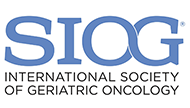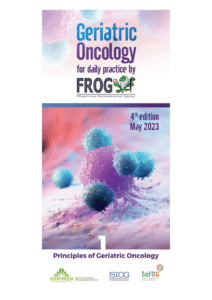
knowledge and techniques. This book, available in French and English languages, is also available in digital form on the free application “FROG ONCOGERIATRICS”.
The first volume highlights the frailty of the older cancer patient, the course of oncological care and the optimization of cancer treatment in this population.
The second volume summarizes existing recommendations and formulates specific management proposals for the older cancer patient with a solid tumor or hematologic malignancy.
Patient functional age is a primary determination when considering appropriate therapy for an older patient with cancer. The Geriatric Assessment is used to determine the “right level” of cancer treatment ensuring the highest level of agreement among the theoretical indication for oncological treatment for which a benefit is expected, the prognosis and therapeutic alternatives for cancer treatment, and the geriatric syndromes. The Geriatric Assessment’s goal is to guide therapeutic interventions and devise strategies to make sure that the patient will have the functional reserves needed to tolerate potential complications. The therapeutic index is narrower in the older patient. The preservation of quality of life and functional independence are priorities.
The oncogeriatric literature shows that Geriatric Assessment and the identification of frailty influence initial cancer treatment decisions in 20-30% of the patients. Geriatric syndromes are frequent, and their recognition is essential. The over or under treatment of the older adult with cancer will continue to be very frequent if the patient presentation in a multidisciplinary consultation meeting is reduced to be tumor centered.
FRENCH LANGUAGE VERSION
Download the first volume, Principles of Geriatric Oncology, here
Download the second volume, Treatments and Medical Care, here
ENGLISH LANGUAGE VERSION
Download the first volume, Principles of Geriatric Oncology, here
Download the second volume, Treatments and Medical Care, here
This edition of the book and its translation into English were made possible thanks to the support of the ACTT association (Agir contre le Cancer Tous ensemble à Tenon) and an independent educational grant from the Helsinn, Mundipharma and Pfizer laboratories. Helsinn, Mundipharma and Pfizer have had no influence on the content of the book or on the opinions expressed by its authors. The book is published under the auspices of the International Society of Geriatric Oncology (SIOG) and the Francophone Society of OncoGeriatrics (SoFOG).
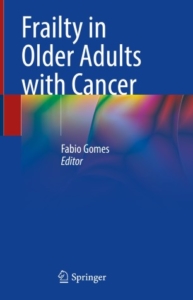
Springer, Cham – 2022
ISBN 978-3-030-89162-6
This book summarizes evidence on frailty and ageing, how this may impact outcomes and how this can be incorporated in the decision-making process for cancer treatment. It discusses quality of life on frail senior adults and patient goals of care. The book aims to improve patient-treatment selection and the outcomes of patients by empowering clinicians to properly assess patients for frailty, either on their own or within a multidisciplinary setting.
The reader will learn the methods available for assessing for frailty, such as screening tools, but also how to perform geriatric assessments by providing details on each component (functional, nutritional, social, psychological, etc.). The book also provides information on how to manage and intervene on frailty with the role of pre-habilitation and re-habilitation, how to set-up frailty teams and pathways within one’s hospital and community. Finally, frailty and associated research per cancer type are discussed in detail along with biomarkers of frailty and future directions.
To buy a copy, please visit the Springer website: https://link.springer.com/book/10.1007/978-3-030-89162-6
 The European Society for Medical Oncology (ESMO) and the International Society for Geriatric Oncology (SIOG) developed this handbook in 2010, which was initiated by Dirk Schrijvers, Branko Zakotnik, Riccardo Audisio, Hendrik van Halteren, Arti Hurria, and the undersigned. Cancer is a disease related to ageing, and the proportion of senior patients increases worldwide. While the proportion of persons beyond age 70 is still small in developing countries, their numerous population means that there are more “elderlies” in India than in Europe. More info
The European Society for Medical Oncology (ESMO) and the International Society for Geriatric Oncology (SIOG) developed this handbook in 2010, which was initiated by Dirk Schrijvers, Branko Zakotnik, Riccardo Audisio, Hendrik van Halteren, Arti Hurria, and the undersigned. Cancer is a disease related to ageing, and the proportion of senior patients increases worldwide. While the proportion of persons beyond age 70 is still small in developing countries, their numerous population means that there are more “elderlies” in India than in Europe. More info
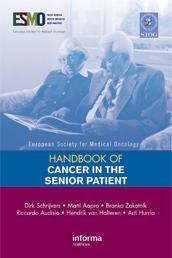 Date of publication: May 2010
Date of publication: May 2010
Number of pages: 200
Book Authors: Dick Schrijvers, Matti Aapro, Branko Zakotnik, Riccardo Audisio, Hendrik van Halteren, Arti Hurria
The European Society for Medical Oncology (ESMO) and the International Society for Geriatric Oncology (SIOG) developed this handbook in 2010, which was initiated by Dirk Schrijvers, Branko Zakotnik, Riccardo Audisio, Hendrik van Halteren, Arti Hurria, and the undersigned. This handbook is not only for Europeans. Cancer is a disease related to ageing, and the proportion of senior patients increases worldwide. While the proportion of persons beyond age 70 is still small in developing countries, their numerous population means that there are more “elderlies” in India than in Europe.
In 2015, the decision was made to start updating this content so as to bring you the latest developments on this important topic.
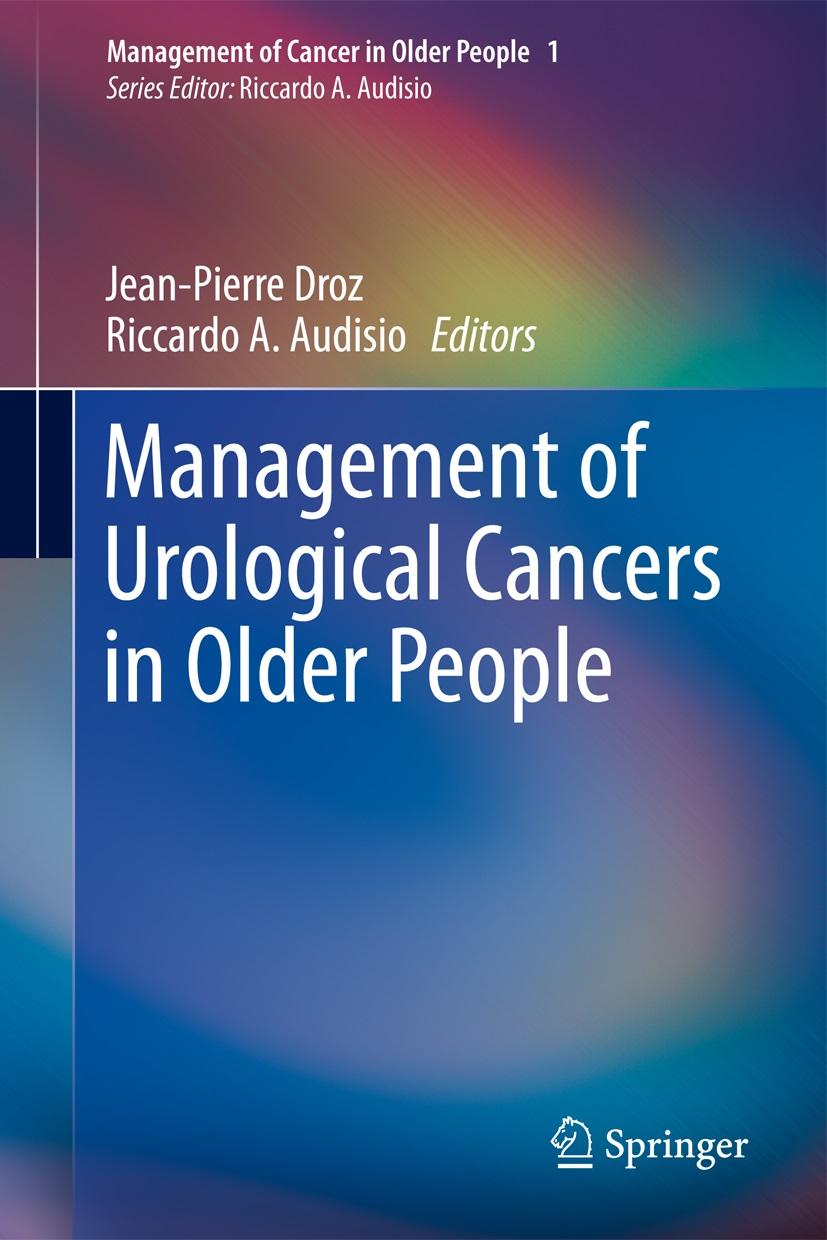 Management of Urological Cancers in Older People
Management of Urological Cancers in Older People
Authors: Droz, Jean-Pierre; Audisio, Riccardo A (Eds.)
2013, XIII, 373 p. 25 illus., 19 in color.
Available Formats: eBook and print
Hardcover: CHF 200.00/€160,45
ISBN 978-0-85729-986-4
Ebook: CHF 160.00/€124,94
eISBN 978-0-85729-999-4
http://www.springer.com/medicine/oncology/book/978-0-85729-986-4
 Management of Gynecological Cancers in Older WomenAuthors: Lichtman, Stuart M.; Audisio, Riccardo A (Eds.)
Management of Gynecological Cancers in Older WomenAuthors: Lichtman, Stuart M.; Audisio, Riccardo A (Eds.)
2013, XIV, 409 p. 16 illus., 6 in color.
Available Formats: eBook and print
Hardcover: CHF 200.00/€160,45
ISBN 978-1-4471-2215-9
eBook: CHF 160.00/€124,94
eISBN 978-1-4471-4605-6
http://www.springer.com/medicine/oncology/book/978-1-4471-2215-9
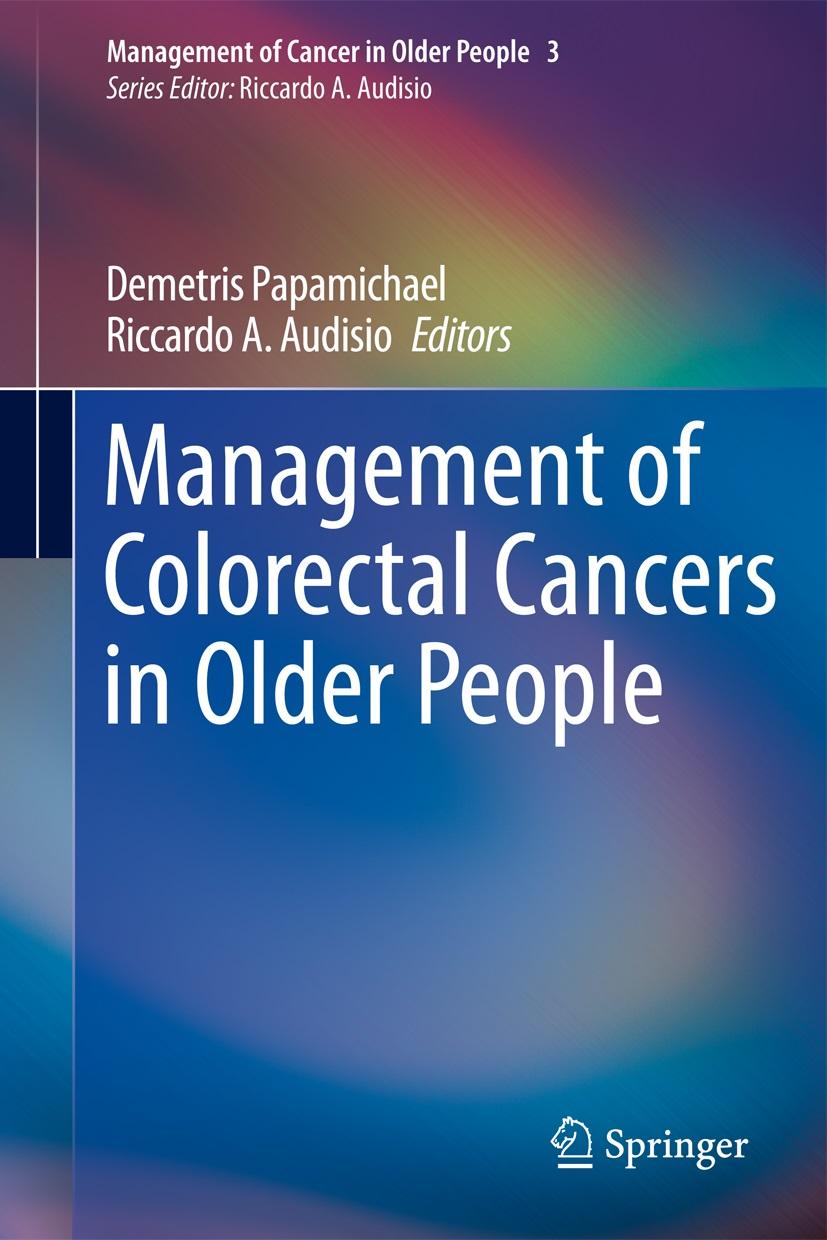 Management of Colorectal Cancers in Older People
Management of Colorectal Cancers in Older People
Authors: Papamichael, Demetris; Audisio, Riccardo A (Eds.)
Expected publication date: April 2013
2013, VIII, 178 p. 12 illus., 8 in color.
Available Formats: eBook and print
Hardcover: CHF 186.50/€149,75
ISBN 978-0-85729-983-3
http://www.springer.com/medicine/oncology/book/978-0-85729-983-3
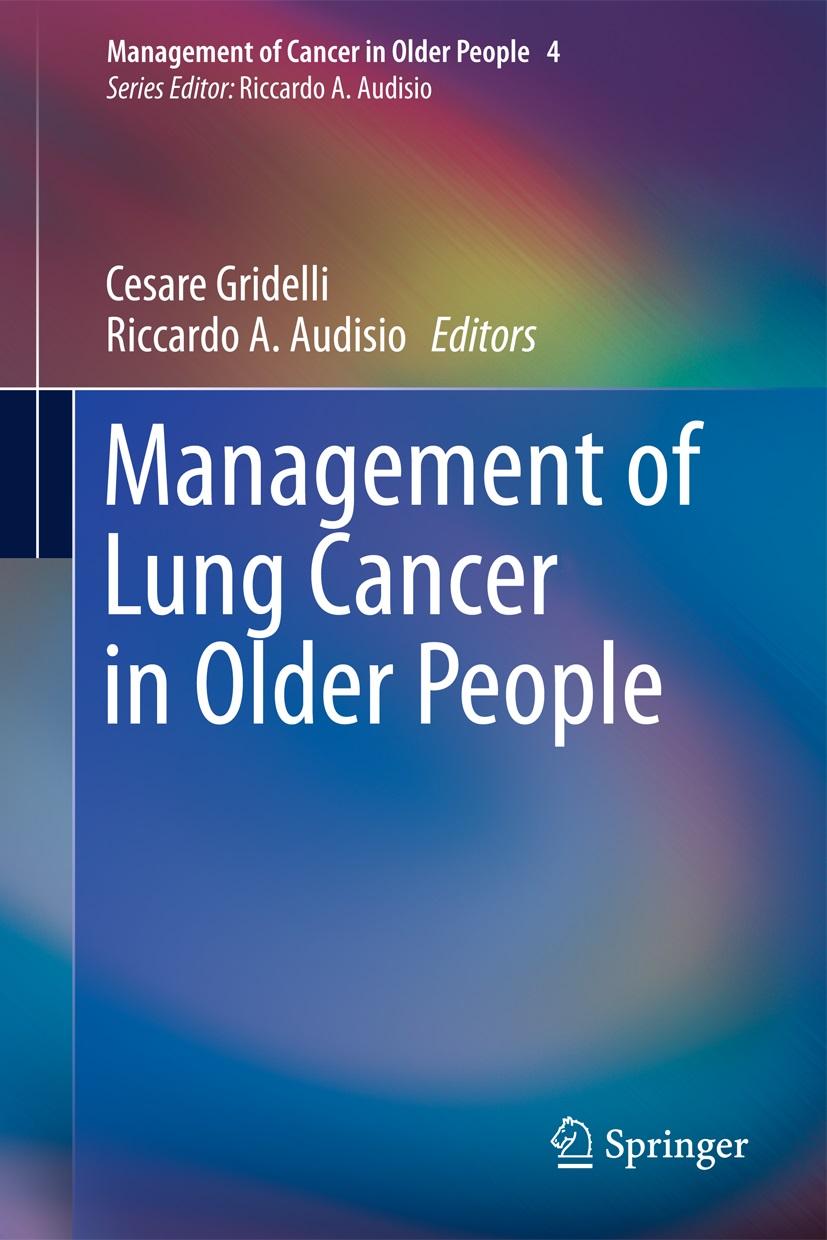 Management of Lung Cancer in Older People
Management of Lung Cancer in Older People
Authors: Gridelli, Cesare; Audisio, Riccardo A (Eds.)
Expected publication date: June 2013
2013, X, 239 p. 20 illus., 14 in color
Available Formats: eBook and print
Hardcover: CHF 186.50/€149,79
ISBN 978-0-85729-792-1
http://www.springer.com/medicine/oncology/book/978-0-85729-792-1
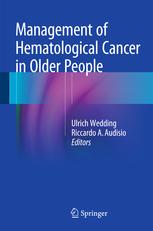 Management of Hematological Cancers in Older PeopleAuthors: Wedding, Ulrich; Audisio, Riccardo A. (Eds.)
Management of Hematological Cancers in Older PeopleAuthors: Wedding, Ulrich; Audisio, Riccardo A. (Eds.)
Expected publication date: Nov 2013
2014, Approx. 300 p. 40 illus. in color
Hardcover: approx. CHF 213.00/€171,15
ISBN 978-1-4471-2836-6
http://www.springer.com/medicine/book/978-1-4471-2836-6
 This book is intended as a comprehensive resource for clinicians and researchers seeking in-depth information on geriatric oncology. The coverage encompasses epidemiology, the biology and (patho)physiology of aging and cancer, geriatric assessment and management, hematologic malignancies, solid tumors, issues in patient care, and research methods.
This book is intended as a comprehensive resource for clinicians and researchers seeking in-depth information on geriatric oncology. The coverage encompasses epidemiology, the biology and (patho)physiology of aging and cancer, geriatric assessment and management, hematologic malignancies, solid tumors, issues in patient care, and research methods.
Since cancer is a disease of aging and people are living longer, most cancer patients are now aged 70 and older. Yet the more we age, the more diverse we become in terms of our health, biologic fitness, and cancer behavior. Typically, however, general oncology clinical trials address only a selected healthier and younger population of patients. Geriatric oncology is the area of oncology that addresses these issues but while a wealth of knowledge has been accumulated, information is often difficult to retrieve or insufficiently detailed. The SpringerReference program, in which this book is published, offers an ideal format for overcoming these limitations since it combines thorough coverage with access to living editions constantly updated chapter by chapter via a dynamic peer-review process, ensuring that information remains current and pertinent.
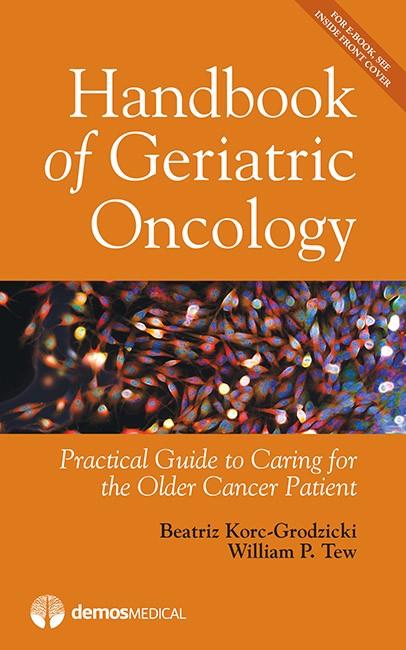 Handbook of Geriatric Oncology: Practical Guide to Caring for the Older Cancer Patient is a practical resource for oncologists and related clinicians who want to provide comprehensive, patient-centered care to the elderly cancer patient. Divided into nine succinct sections, it includes topics spanning an Introduction to Aging and Frailty, Geriatric Syndromes, Geriatric Assessment, Select Cancers in the Elderly, Communication With the Older Cancer Patient, the Nursing Home Patient With Cancer, Models of Care: Survivorship, Palliative Care, and Integrative Medicine.
Handbook of Geriatric Oncology: Practical Guide to Caring for the Older Cancer Patient is a practical resource for oncologists and related clinicians who want to provide comprehensive, patient-centered care to the elderly cancer patient. Divided into nine succinct sections, it includes topics spanning an Introduction to Aging and Frailty, Geriatric Syndromes, Geriatric Assessment, Select Cancers in the Elderly, Communication With the Older Cancer Patient, the Nursing Home Patient With Cancer, Models of Care: Survivorship, Palliative Care, and Integrative Medicine.
Key Features
- Provides best practices for evaluating geriatric syndromes such as functional dependency, falls, cognitive impairment and dementia, delirium, depression and anxiety, social isolation as well as syndromes related to nutrition, comorbid conditions, and polypharmacy.
- Includes practical guidance on when to treat and when not to treat cancer in older patients
- Discusses unique factors associated with breast cancer, prostate cancer, colorectal cancer, lung cancer, ovarian cancer, bladder cancer, pancreatic cancer, head and neck cancers, and myelodysplastic syndromes in the elderly that impact care plans and treatment.
For a complete description, including a Table of Contents and Sample Chapter, click on the link: https://www.springerpub.com/handbook-of-geriatric-oncology-9781620701041.html
 Authors: Keith M Bellizzi, Margot Gosney
Authors: Keith M Bellizzi, Margot Gosney
ISBN: 978-0-470-87442-4
Hardcover, 536 pages
Book Description:
Here is the first truly multidisciplinary handbook available that examines the cancer and aging interface along the entire cancer care continuum, from cancer prevention to end of life and palliative care. Detailed clinical and research information is enhanced with the latest evidence-based and best practice materials to guide patient treatment and caregiver training, research, and intervention.
Order Information:http://www.wiley.com/WileyCDA/WileyTitle/productCd-0470874422.html
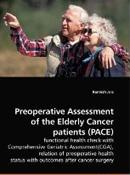 Functional health check with Comprehensive Geriatric Assessment (CGA), relation of preoperative halth status withz outcomes after cancer surgery.
Functional health check with Comprehensive Geriatric Assessment (CGA), relation of preoperative halth status withz outcomes after cancer surgery.
Author: Ramesh Jois
ISBN 978-3-639-23337-7
Elderly population is expanding at a rate never seen before. The risk of developing cancer rises with longevity. Surgeons will have to learn to deal with rising geriatric cancer burden.The treatment of choice for solid cancers regardless of the age is surgery. Prevalence of co-morbidity in the elderly enhances the risk of treatment related complication. Discriminating fit from frail elderly patients is difficult in the absence of a reliable tool to appraise preoperative functional health. Appraisal of the ?functional age? instead of ?chronological age? facilitates counseling for intervention and titrating therapy. A screening tool to identify the elderly at risk of complications from surgical interventions is urgently needed. A tool which facilitates avoiding under treatment of fit elderly and over treatment of frail patients is needed. In this book preoperative health status of the elderly undergoing major cancer surgery has been tested using comprehensive geriatric assessment (CGA).First time ever, association of postoperative outcome with preoperative functional health is tested using CGA among the elderly undergoing major cancer surgery.
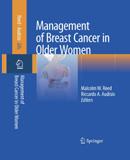 Editors: M. W. Reed and R. A. Audisio
Editors: M. W. Reed and R. A. Audisio
Publisher: Springer (2010)
ISBN-13: 978-1848002647
More info
I was looking at Mrs T – all 45 kilos of her – with somewhat puzzled thoughts. I had prescribed her capecitabine at very prudent doses, in view of her 91-year-old kidneys and physiology. She had reduced my treatment even further, “because it was making her tired.” As a result, she was taking a grand total of 500 mg of capecitabine a day. Yet, her metastatic, ER/PR-negative, Her2-positive breast cancer was undoubtedly responding. Her pain was improving and her chest mass was shrinking, as were her lung metastases… What was the secret of that response? Were Mrs T’s kidneys eli- nating even less drug than predicted by her creatinine clearance? Was her sarcopenia altering drug distribution? Was she absorbing more drug than average? Or was her tumor exquisitely sensitive to fluoropyrimidines? “Physicians,” said Voltaire, “pour drugs they know little for diseases they know even less into patients they know no- ing about.” Medicine has made tremendous progress since the eighteenth century. Yet, there are fields where quite a lot remains to be learned. In developed countries, 25% of breast cancers occur in patients aged 75 years and older. Yet, these patients represent only 4% of the population of traditional clinical trials. That ought to let us wonder how relevant data acquired in patients in their 60s are to a nonagenarian. Fortunately, geriatric oncologists have been stepping up to the task and have gen- ated data to help us to treat such patients.
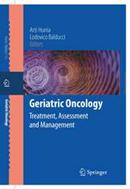 Authors: A. Hurria (City of Hope, Duarte, CA, USA) and L. Balducci (H. Lee Moffitt, Tampa, FL)
Authors: A. Hurria (City of Hope, Duarte, CA, USA) and L. Balducci (H. Lee Moffitt, Tampa, FL)
Comment on Springer website
ISBN 978-0-387-89069-2
Intended for medical oncologists and health care professionals involved in managing older patients with cancer, this book presents recent developments in geriatric assessment and in cancer management for the older adult.
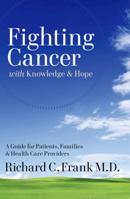 Author: Richard C. Frank, MD
Author: Richard C. Frank, MD
ISBN-13: 9781863954341
Anyone who is diagnosed with cancer receives a frightening blow, and in many cases the diagnosis is accompanied by a bewildering array of treatment choices. In this invaluable book, Dr. Richard C. Frank offers comfort and help to cancer patients, their families, and their caretakers. Dr. Frank empowers patients by unlocking the mysteries of the disease and explaining in plain language the ways to confront and combat it. An award-winning medical oncologist recognized for his humanitarian approach as well as his research accomplishments, Dr. Frank understands that cancer patients and their families need insight into the disease along with a sense of control.He therefore addresses these vital topics: what cancer is and how it spreads; how cancer treatment strategies are chosen; how cancer-fighting drugs work to shut down the growth of the disease; which factors affect a patient’s prognosis; how patients can visualize cancer treatments at work in the body and why this is helpful; and, how to deal with ‘uncurable’ cancer. With a wealth of patient case histories, helpful coping strategies from cancer survivors, and up-to-date information on useful resources, “Fighting Cancer” is a book cancer patients and their loved ones can turn to with confidence and hope.
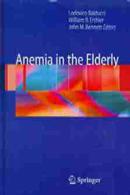 Authors: Balducci L, Ershler WB, Bennett JM, Editors
Authors: Balducci L, Ershler WB, Bennett JM, Editors
Springer Science and Business Media LLCNew York 2007
ISBN-13: 978-0-387-49505-7
Comment in JAMA
Anemia in the elderly, known as the silent epidemic, afflicts 3 million people in the U.S. ages 65 or older. This reference, complete with the most recent findings, answers all the crucial questions regarding anemia in the elderly.
 Authors: Balducci L, Ershler WB, de Gaetano G, Eds
Authors: Balducci L, Ershler WB, de Gaetano G, Eds
Cambridge University Press Cambridge, UK 2008
ISBN 978-0-521-87573-8
The developed world has an increasingly aging population, with approximately 10% of the population aged over 65 years. As the incidence and prevalence of blood disorders increases with age, these conditions are a heavy burden on healthcare systems. Blood Disorders in the Elderly will provide hematologists, geriatricians and all clinicians involved in the care of patients with blood disorders with clear clinical advice on the diagnosis and management of these conditions. The introductory section reviews epidemiology of aging and anemia and provides a comprehensive approach to the management of cancer in the aging patient. This is followed by a full discussion of hemopoiesis and changes it undergoes in aging. The remaining sections cover the diagnosis and management of all major disorders: anemia, malignancy, coagulation and platelet disorders and hemophilia. A detailed chapter on antithrombotic therapies is also included.
